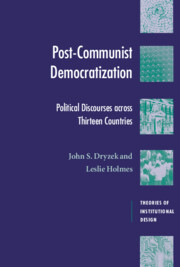Book contents
9 - Georgia
Published online by Cambridge University Press: 22 September 2009
Summary
Georgia issued one of the first challenges to the integrity of the Soviet Union in the Gorbachev era. By 1988 there were clear signs that this small (population c. 5.5 million) Transcaucasian state could soon demand independence. Many Georgians saw their situation as similar to that of the Baltic states – viz. that they had been forcibly annexed by the Soviets, albeit much earlier (1921). Georgia declared its independence in April 1991, earlier than most former Soviet republics.
But breaking the ties with the Soviet Union proved problematic. Russia was unhappy about this. Georgians themselves were deeply divided about the type of country they wanted, as symbolized by divided attitudes toward the most famous Georgian of the twentieth century, Djugashvili -known to the world as Stalin. Here was yet another country with identity problems that complicated the transition to post-communism.
Before, during, and immediately after the collapse of the Soviet Union, Georgia was visited by most of the horrors that could afflict a postcommunist society. Georgia was an ethnically diverse state, with relatively small but geographically concentrated minorities: Abkhazians in Abkhazia, Ossetians in South Ossetia, Armenians in the south, Azeris in the southeast. Such concentrations can lead to autonomist, secessionist, or irredentist demands. Some 70 percent of the population was ethnically Georgian. The impending collapse of the Soviet Union was heralded by the rise of extreme authoritarian nationalism in Georgia.
- Type
- Chapter
- Information
- Post-Communist DemocratizationPolitical Discourses Across Thirteen Countries, pp. 147 - 157Publisher: Cambridge University PressPrint publication year: 2002



